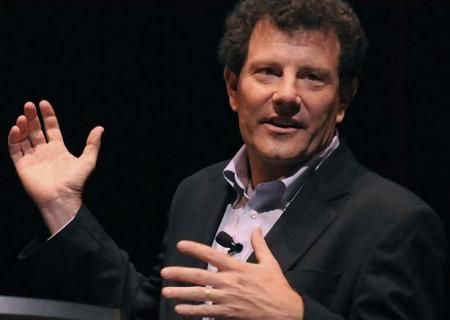New York Times columnist to visit Ames

Courtesy of Iowa State University Lectures
Nicholas Kristof, award-winning New York Times columnist and author, was in Ames Monday, Sept. 14 for his lecture, “Why We Should Care About the World and Want to Change It.”
September 13, 2015
Award-winning New York Times columnist and author Nicholas Kristof will be in Ames Monday night to share with students how they can best make a difference in the world.
Kristof’s lecture, titled “Why We Should Care About the World and Want to Change It,” is at 8 p.m. in Stephens Auditorium. Doors open at 7:15 p.m. and is free with general admission seating.
He’ll be talking about the importance of young people’s responsibility to find ways to get engaged with the rest of the world. The lecture focuses on how students can spring into action themselves and how best they can do so.
“I admire the passion a lot of young people have for getting engaged for doing things to make a better world,” Kristof told the Daily Sunday night.
Kristof draws on his decades of experience in traveling the world to report on human rights and women’s issues and will share stories of his time on the road.
He’s traveled to more than 150 countries to report on human rights issued, and during his travels has, according to American Program Bureau’s biography on Kristof, caught malaria, experienced wars, confronted warlords, encountered an Indonesian mob and survived an African airplane crash.
Kristof co-authored two books that inspired two PBS documentaries, “Half the Sky: Turning Oppression Into Opportunity for Women Worldwide” and “A Path Appears: Transforming Lives, Creating Opportunity,” both part of the Global Women and Girls Lead Initiative to promote women’s empowerment internationally.
Kristof said he’ll share some of his experiences from reporting around the world, including some of his reporting on human trafficking, or a form of modern-day slavery in which someone uses force, fraud or coercion to lure victims and force them into labor or commercial sexual exploitation for the profit of someone else.
College students are at an influential age, he said, and hopes to inspire those who attend to somehow get informed and get involved.
“I would like to not just inform people, but galvanize them, get them engaged in some way,” Kristof said. “Maybe it’s with a club on campus. Maybe it’s thinking about things they can do after graduation. It doesn’t mean people have to become an aid worker, but that they hopefully find a channel they find better for them and the world as well.”
















